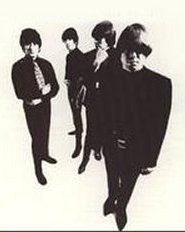
An old bootleg tape with various odds and ends from Don Van Vliet and various bands including early work with Frank Zappa. I was lucky enough to see Captain Beefheart and his Magic Band back in the early 70's at the Royal Albert Hall ( with Foghat who were awful ) and it was amazing - even better live than on record despite the sound problems. Always a fan since hearing a terrific session on the John Peel show in 1967.
Wikipedia says -
"Born January 15, 1941(1941-01-15)
Glendale, California, U.S.
Died December 17, 2010(2010-12-17) (aged 69)
Arcata, California, U.S.[1]
Genres Experimental rock, blues-rock, avant-garde, psychedelic rock, progressive rock,[2] free jazz, protopunk, surrealist, spoken word, outsider, alternative rock,
Occupations Songwriter, singer, musician, artist, poet, lyricist, composer, record producer, film director
Instruments Vocals, harmonica, saxophone, clarinet, oboe, french horn, shehnai, recorder, flute, piccolo, piano
Years active 1964–1982
Labels A&M, Buddah, Blue Thumb, ABC, Reprise, Straight, Virgin, Mercury, DiscReet, Warner Bros., Atlantic, Epic
Associated acts The Magic Band, Frank Zappa, The Mothers of Invention, The Tubes, Jack Nitzsche
Don Van Vliet (pronounced /væn ˈvliːt/), born Don Glen Vliet (January 15, 1941 – December 17, 2010) was an American musician, singer-songwriter and artist best known by the stage name Captain Beefheart. His musical work was conducted with a rotating ensemble of musicians he called The Magic Band, active between 1965 and 1982, with whom he recorded 12 studio albums. Noted for his powerful singing voice with its wide range, Van Vliet also played the harmonica, saxophone and numerous other wind instruments. His music blended rock, blues and psychedelia with free jazz, avant-garde and contemporary experimental composition. Beefheart was also known for exercising an almost dictatorial control over his supporting musicians, and for often constructing myths about his life.
During his teen years in Lancaster, California, Van Vliet acquired an eclectic musical taste and formed "a mutually useful but volatile" friendship with Frank Zappa, with whom he sporadically competed and collaborated. He began performing with his Captain Beefheart persona in 1964 and joined the original Magic Band in 1965. The group drew attention with their cover of Bo Diddley's "Diddy Wah Diddy", which became a regional hit. It was followed by their acclaimed debut album released in 1967 on Buddah Records, Safe as Milk. After being dropped by two consecutive record labels, they signed to Frank Zappa's newly formed Straight Records. Zappa as producer granted Beefheart the unrestrained artistic freedom in making 1969's Trout Mask Replica, ranked fifty-eighth in Rolling Stone magazine's 2003 list of the 500 greatest albums of all time. In 1974, frustrated by lack of commercial success, he released two albums of more conventional rock music that were critically panned; this move, combined with not having been paid for a European tour, and years of enduring Beefheart's abusive behavior, led to the entire band quitting. Beefheart eventually formed a new Magic Band with a group of younger musicians and regained contemporary approval through three final albums: Shiny Beast (Bat Chain Puller) (1978), Doc at the Radar Station (1980) and Ice Cream for Crow (1982).
Van Vliet has been described as "one of modern music's true innovators" with "a singular body of work virtually unrivalled in its daring and fluid creativity". Although he achieved little commercial or mainstream critical success, he sustained a cult following as a "highly significant" and "incalculable" influence on an array of New Wave, punk, post-punk, experimental and alternative rock musicians. Known for his enigmatic personality and relationship with the public, Van Vliet made few public appearances after his retirement from music (and from his Beefheart persona) in 1982 to pursue a career in art, an interest that originated in his childhood talent for sculpture. His expressionist paintings and drawings command high prices, and have been exhibited in art galleries and museums across the world. Van Vliet died in 2010 after many years of suffering from multiple sclerosis."
Captain Beefheart - Raities Side One








